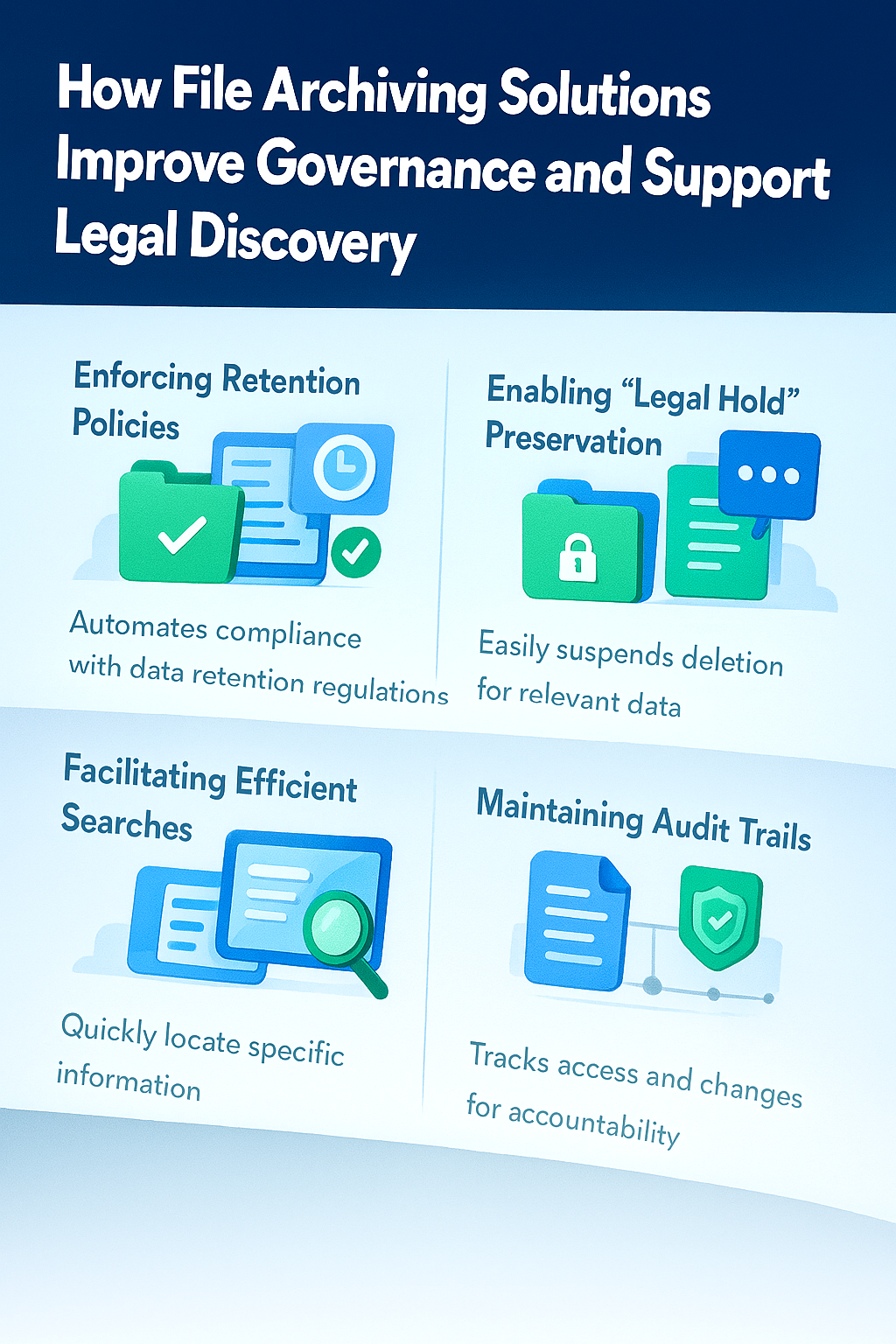Data is multiplying faster than ever—across emails, chats, cloud drives, and AI-generated documents. In this complex environment, maintaining control and compliance is a monumental challenge.
For every enterprise, file archiving legal discovery has become the cornerstone of modern governance—ensuring that data remains searchable, secure, and legally defensible.
While traditional backups merely store data, intelligent archiving solutions actively manage it. They combine policy automation, AI-driven classification, and built-in legal workflows to help organizations achieve true eDiscovery readiness and legal compliance archiving.
The Expanding Risk Landscape of Digital Discovery
Legal discovery once focused on physical files. Now, it involves petabytes of digital evidence—emails, instant messages, and collaboration-app files spread across hybrid systems.
Failing to meet discovery obligations can trigger:
- Court Sanctions & Penalties for missing or destroyed data.
- Negative Jury Inference, assuming lost evidence was harmful.
- Reputational Loss among customers, regulators, and investors.
A proactive file archiving legal discovery framework ensures your organization is always ready—reducing exposure while enhancing operational resilience.
How AI-Powered File Archiving Transforms eDiscovery Readiness
1. Intelligent Information Governance Archiving
Effective discovery starts with clear visibility. AI-enabled information governance archiving automatically classifies and tags data by sensitivity, owner, and context.
Benefits:
- Creates a unified, searchable data ecosystem.
- Simplifies compliance reporting.
- Provides instant insights into what information exists—and where.
2. Retention Policy Automation: Smarter, Safer Data Lifecycle
Manual retention management invites errors. Retention policy automation enforces rules across systems and regions, ensuring data is kept only as long as regulations demand.
Key Outcomes:
- Eliminates over-retention that inflates costs and risks.
- Supports GDPR, HIPAA, and SEC timeframes automatically.
- Enables “defensible disposal” with audit confirmation.
3. Legal Hold Software: Instant Preservation at Scale
When litigation is likely, data must be frozen—fast. Integrated legal hold software in modern archives makes this simple and auditable.
Capabilities:
- One-click activation across user accounts and file types.
- Tracking dashboards for hold status and custodians.
- Automated notifications for compliance teams.
This ensures that relevant evidence is protected, preventing spoliation and proving your organization’s diligence.
4. Unified eDiscovery Readiness: From Chaos to Control
Legal teams often waste weeks collecting data from disparate systems. A centralized electronic discovery solution eliminates this chaos.
Advantages:
- Rapid keyword and metadata searches.
- Early Case Assessment (ECA) to reduce irrelevant data.
- Export tools for legally accepted formats.
By integrating discovery into archiving, organizations cut review time and cost while boosting legal accuracy.
5. Ensuring Authenticity with Immutable Audit Trails
Courts demand proof that evidence hasn’t been altered. Archiving platforms safeguard authenticity through encryption and chain-of-custody tracking.
Core Features:
- Cryptographic Hashing validates file integrity.
- Immutable Storage prevents unauthorized edits.
- Comprehensive Audit Logs record every access event.
The result: evidence that meets the strictest legal admissibility standards.
6. Continuous Legal Compliance Archiving
Beyond lawsuits, organizations face daily compliance demands—from data-privacy regulators to industry watchdogs.
How Archiving Helps:
- Centralizes records for quick FOIA or GDPR responses.
- Demonstrates accountability to auditors and boards.
- Bridges IT, legal, and compliance departments under one governance model.
This holistic view transforms compliance from a reactive duty into a proactive discipline.
The Role of AI & Automation in Next-Gen Archiving
AI adds a new dimension to file archiving legal discovery by turning static archives into intelligent data engines:
- Predictive Tagging: AI detects potential legal relevance before cases arise.
- Anomaly Detection: Flags suspicious deletions or policy violations.
- Smart Summarization: Speeds up document review during eDiscovery.
This automation reduces manual labor while strengthening both compliance accuracy and operational agility.
Building a Culture of Compliance and Readiness
Technology alone isn’t enough. Sustainable eDiscovery readiness depends on clear policies, trained staff, and consistent oversight.
Best Practices:
- Embed archiving policies into employee workflows.
- Conduct quarterly retention-policy audits.
- Integrate legal, IT, and risk teams in governance planning.
- Monitor KPIs like “time to respond” and “data under hold.”
From Liability to Strategic Advantage
When treated strategically, file archiving legal discovery becomes a source of confidence, not concern.
You gain:
- Predictable legal response times.
- Reduced discovery expenses.
- Stronger regulatory trust.
- Enhanced data-driven decision-making.
Modern information governance archiving tools enable businesses to transform data from a potential liability into a future-proof, compliant asset—ready for whatever legal or regulatory challenge comes next.





Comments